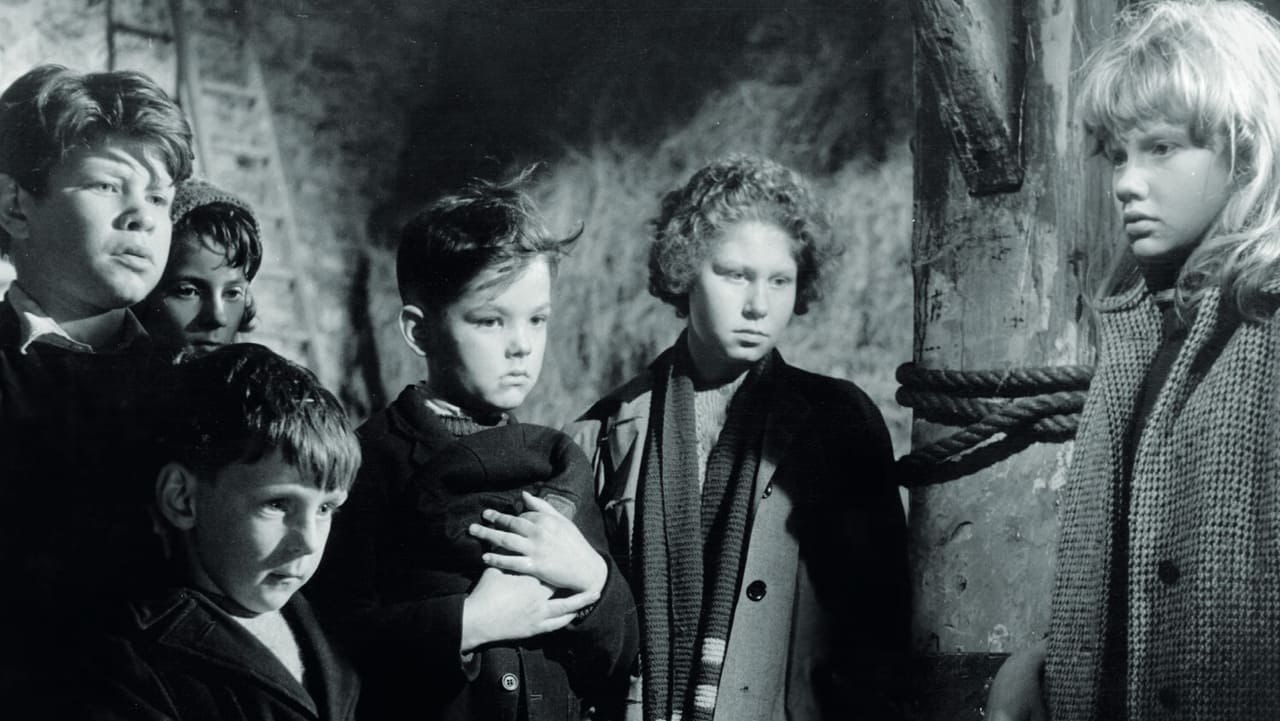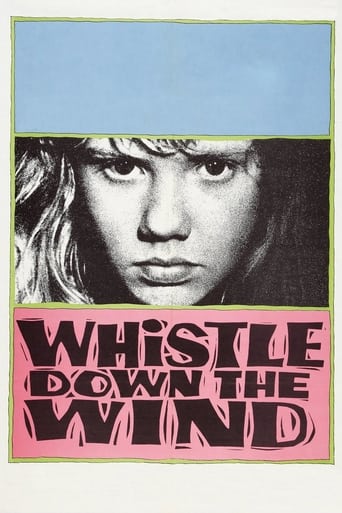

The original novel WHISTLE DOWN THE WIND, written in 1959 by Mary Hayley Bell, who is Hayley Mills' mother, so there is little wonder that Hayley is cast as the lead after Disney's POLLYANNA (1960) has catapulted her to stardom and she has become the last person ever to receive a Juvenile Oscar. Also it marks a director debut of Bryan Forbes (SÉANCE ON A WET AFTERNOON 1964).Hayley plays Kathy Bostock, a young schoolgirl living in the farm of Lancashire, with her widowed father (Lee), her younger sister Nan (Holgate) and younger brother Charles (Barnes), as well as their auntie (Wagstaff). Due to a sheer coincidence, Kathy firmly believes a man (Bates) who hides in their barn, is Jesus Christ himself, this is where the story works, thanks to Hayley's superbly credible performance and her mother's well-conceived creation, Kathy is disconcerted by speaking of the truth of Jesus and for fear of being punished for blasphemy, so it is pretty logic for her to be startled by the man's exact presence in the barn and his muttering word "Jesus Christ" before passing out, and believes he is Jesus, arrives for the Second Coming. It potently justifies a rather cockamamie situation, which serves as the cornerstone for the ensuing happenings. Once Kathy is on board, it is not difficult to convince her two younger and more impressionable siblings to believe her words, then a whole bunch of school-kids, deferentially joins them to worship Jesus-in-the- barn.The story fluidly blends children's naiveté with the religious influence, and stimulates sheer zest and excitement in children's endeavour to save Jesus from the intervention of adults, and the man's true identity, a criminal on the lam, consigns a trenchant contradiction into a dichotomy between children's innocence and grown-ups' worldliness, where credulity and blind faith are put to good use by the man, for his own interest, who even menaces the children-friendly trappings with a gun in hand in the final siege, and from A to Z, the film has been deliberately avoiding to address the elephant-in-the-room, so in the end, in Kathy's eyes, it is Jesus who has been captured, not a wanted offender.The three children are the backbone of this rustically beguiling film, Hayley Mills' dogged devotion towards her belief, Diane Holgate's spur-of-the-moment slip and Alan Barnes' fractious mischief, plus his adorable acting-cum-being-himself antics (and he is the one who is telling the truth, although no one takes him seriously), all enliven the relatively small scale of the narrative with immense delight. Alan Bates, only in his second film role, underplays his handsomeness (although the requisite is that he should look at least remotely like J.C.) to foreground the moral ambiguity of his character, a cynical chap, very cagey about his criminal background (supposedly to be a wife murderer according to IMDb), he is a blank paper just plays along with the kids to secure a getaway plan, at one point, viewers are tempted to be ready for something rather ugly will happen, which is foiled regarding to the family-friendly grain, but a sense of remorse is accurately added in his last words? There is no cheesy redemption to facilitate a feel-good ending, and under the coat of a children story, the film in effect, pinpoints how easily religion can corrupt a child's psyche, being a double-edged sword, sometimes it is much sharper than we think, we must wield it cautiously.
... View MoreLike many pictures, Whistle Down the Wind is a frustrating mixture of the good and the bad.The good includes:A screenplay by Keith Waterhouse and Willis Hall that keeps the embarrassment down to an endurable minimum.The uniformly good, natural performances that Bryan Forbes coaxed out of all those untrained kids (probably the best ensemble acting by children I have seen).The bad includes:A lazy, inappropriate 'Mickey Mouse' score by Malcolm Arnold that continually undermines the realistic aesthetic of the picture.An ill-conceived premise in which Kathy, a girl who appears to be about 12 or 13, finds a man in her barn and concludes he is Jesus, largely on the basis of an expletive that she must have heard a hundred times. This excruciating piece of whimsy requires Kathy to act like a credulous retard (who nonetheless manages to draw all the other local children into her improbable delusion). When young Charles glumly observes "he's just a fella' the whole fragile premise of the picture collapses.The numerous parallels with the New Testament story (the stable, the bearing of gifts, the disciples, the 'teaching', the three denials, Judas/Doubting Thomas, the crucifixion pose, etc.) are never too obtrusive and the story flows just as naturally if you don't notice them. Nonetheless, they are still an essentially pointless artifice that subtracts meaning from the movie, rather than adding it.This film seems to encourage people to sound off about the simple faith of children and the cynical worldliness of adults, but this sort of analysis doesn't bear scrutiny and, in truth, this picture is always saying less than it thinks it is.The best I can say of Whistle Down the Wind is that it is a bad idea well executed.PS: I have never read the book, but I suspect Kathy is somewhat younger than she appears here. It might have been better to use a child of the right age, rather than the 15-year-old Hayley Mills. She did make a fairly convincing 12-year-old, but that was still too old and compromised whatever credibility the story might have had. Then again, the movie probably wouldn't have been made without her.
... View MoreAlthough WHISTLE DOWN THE WIND is a sincerely-felt and sensitive treatment of a highly unusual plot line, Bryan Forbes' film seems to have cribbed its major plot premise from the 1950 screen adaptation of Damon Runyon's JOHNNY ONE-EYE. In this independent, low-budget programmer, wounded gangster Pat O'Brien, running from a murder charge, hides out in a deserted Greenwich Village building. A neighborhood moppet and her one-eyed dog stumble upon him, and she mistakes him for Santa Claus. She keeps his secret and smuggles food to the doomed fugitive.Unfortunately, Robert Florey's direction lacks the taste and restraint that Bryan Forbes brings to the same subject matter, and the JOHNNY ONE-EYE's storyline becomes swamped in bathos and saccharine sentimentality. Although Mary Hayley Bell was lauded for her apparently strikingly original plot line, it appears to have been a reworking of this unpretentious Damon Runyon short story.
... View MoreA thought-provoking film about childhood innocence and a clever satire on religious beliefs, the plot may not sound like much but it works very well. The visual side of the film is magnificent, carefully directed with an eye for lightness versus darkness and spatial relationships. The shots are all captured well by the cinematographer in simple but effective black and white. It is a tad too slowly paced, with the many non-dialogue sequences dragged out, and the mix of thick accents and whispering makes what dialogue there is difficult to understand at times. But if not perfect, this is still a wonderful piece of cinema. The child performances are generally good, and the satirical bits are genuinely amusing. It is definitely worth seeing if the premise sounds appealing.
... View More